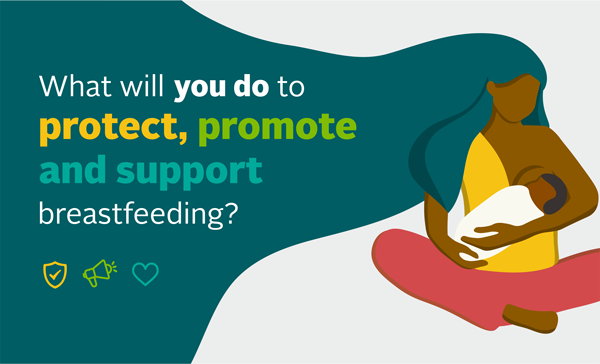DO YOU PLAY YOUR PART IN SUPPORTING MUMS TO BREASTFEED?
August 2022
Supporting breastfeeding is not just for health professionals; it involves all of society. Not many people realise the impact they can have on a mom’s experience when it comes to exclusively breastfeeding her new baby for the first six months of life. Misguided advice, thoughtless comments and shaming attitudes from family members, friends and colleagues can take their toll, especially on new mothers who are experiencing a uniquely vulnerable time.

Breastfeeding has nothing but benefits – it boosts and protects both mom and baby’s health in multiple ways, encourages vital bonding and offers a best possible start out in life for an infant. Breastfeeding is also a vital source of food security for babies and families, communities and countries, which cannot be ignored in times of food supply disruptions and climate change impacts. So, if you find yourself feeling uncomfortable or even, negative when it comes to the topic of breastfeeding, it may be time to think again.
World Breastfeeding Week, which is celebrated over the first week of August every year, is encouraging individuals from all walks of life to become part of the warm chain that supports breastfeeding. This is a reminder that we all have the power to choose to be allies when it comes to changing our world for the better.
Why do breastfeeding moms need support?
Like other mammals, human babies are born with a reflex to seek their mother’s breast – but that doesn’t mean that breastfeeding is easy for all. Every mother and baby dyad is unique, so even if a mom breastfed a first baby easily, she may have a totally different experience with a new baby. It’s normal for many mothers to need practical and problem-solving support; and for breastfeeding to take practice for both mothers and babies. Breastfeeding is also time-intensive, which means that new mothers need space and extra support at home.
Maria van der Merwe, President of ADSA, (The Association for Dietetics in South Africa), points out that South Africa still has far to go when it comes to improving its low rate of exclusive breastfeeding for the first six months of life, which was last reported in 2016 at less than 32%. She says, “Mothers in South Africa face a host of barriers to breastfeeding, that range from societal attitudes and the interference of family and friends to the pervasive lack of access to healthcare support and workplaces that are either hostile or discouraging to breastfeeding mothers. This is why a multi-pronged, countrywide effort is required. We need to be more aware of the challenges moms may face, and more supportive in connecting them to sustainable solutions. People who disparage mothers who breastfeed in public need to be aware that because feeding infants where and when they are hungry is so important, this is protected by law. In addition, companies are required to ensure that new mothers in their employ are able to take private breaks to express breastmilk during their working hours.”
What can you do to support breastfeeding moms?
Supportive communications – Be aware of what you say to new moms in your family and friend circles. There are many myths about breastfeeding, and it is not helpful to inadvertently share these. Avoid casting doubt on a new mom’s abilities to exclusively breastfeed for the first six months of life by suggesting introducing solid foods or switching to infant formula, even if this is something that you did with your babies. Moms who are struggling or have any anxieties about breastfeeding should be advised by their healthcare professionals or lactation specialists who will support their unique breastfeeding journeys. Be a cheerleader for your friends and relatives who are breastfeeding, even if you’re not a parent or a mom who breastfed.
Supportive partners – If your partner is breastfeeding, you are in a fantastic position to champion breastfeeding every day. Take on the role of creating a home conducive to breastfeeding by freeing up the new mom from energy and time-sapping chores. Get involved in burping after feeds and bathing the baby, as well as taking on the grocery shopping and food preparation so that mom has stress-free time to focus on breastfeeding.
Supportive workplaces – Unfortunately, the need to return to work is one of the most common reasons why new moms give up on breastfeeding. The WHO (World Health Organization) recommends exclusive breastfeeding for the first six months of life, and ongoing breastfeeding, up to and over two years of age. But employed mothers usually get maternity leave for just 3 or 4 months, or less. As a business leader or owner, you can step up for breastfeeding by making it easy for the moms on your staff to express and store breastmilk at work. It is mandatory to ensure that breastfeeding employees get at least two 30-minute breaks to breastfeed or express breastmilk during the first six months of the infant’s life. You can also make sure moms on your staff have a conducive, private space, and access to a fridge to store breastmilk.
Maria concludes, “South Africa has some way to go in the development of a true pro-breastfeeding culture that will improve our dismal breastfeeding record. While the WHO has set a country target of a 50% breastfeeding rate by 2025, breastfeeding with all its health benefits and as a food security strategy should be the norm for South African moms.”




























